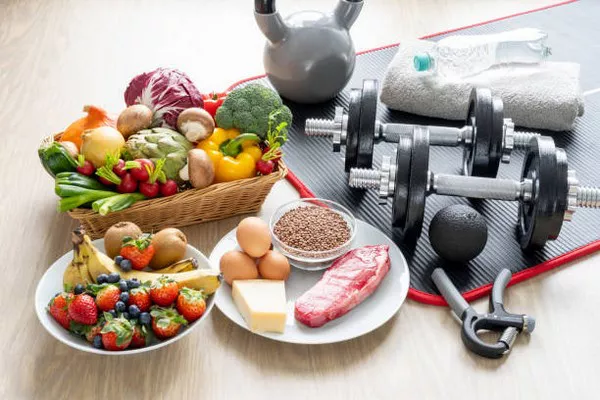Nutrition refers to the process by which the body takes in and utilizes food and nutrients. It involves understanding the relationship between food, health, and well-being. Proper nutrition is essential for maintaining good health, supporting bodily functions, and achieving fitness and weight loss goals.
Key Nutrients and Their Roles
Macronutrients:
Carbohydrates: Provide energy. Found in foods like bread, pasta, fruits, and vegetables.
Proteins: Build and repair tissues. Found in meat, fish, beans, and dairy products.
Fats: Support cell function and provide energy. Found in oils, nuts, and avocados.
Micronutrients:
Vitamins: Organic compounds essential for various bodily functions.
Minerals: Inorganic elements like calcium and iron, crucial for health.
Water: Vital for hydration, digestion, and temperature regulation.
The Importance of a Balanced Diet
A balanced diet provides all the essential nutrients in the right amounts. It includes a variety of foods from all food groups: fruits, vegetables, grains, proteins, and dairy. A well-rounded diet supports energy levels, muscle growth, and overall health.
Fitness and Exercise: Building a Healthy Body
Types of Exercise
Cardiovascular Exercise:
Activities like running, cycling, and swimming.
Improves heart health and burns calories.
Strength Training:
Lifting weights or using resistance bands.
Builds muscle mass and increases metabolism.
Flexibility and Balance:
Yoga, Pilates, and stretching exercises.
Improves range of motion and prevents injuries.
Creating a Workout Routine
Set Clear Goals: Define what you want to achieve (e.g., weight loss, muscle gain).
Choose the Right Activities: Select exercises that you enjoy and suit your goals.
Create a Schedule: Plan your workouts, including rest days, to ensure consistency.
Progress Gradually: Start slow and increase intensity over time.
Weight Loss Strategies: Practical Tips for Success
Understanding Caloric Balance
To lose weight, you must consume fewer calories than you burn. This concept is known as a caloric deficit. It can be achieved through a combination of diet and exercise.
Effective Diet Tips
Eat Whole Foods: Focus on unprocessed foods like fruits, vegetables, lean proteins, and whole grains.
Control Portion Sizes: Be mindful of serving sizes to avoid overeating.
Stay Hydrated: Drink plenty of water throughout the day.
Limit Sugary and Processed Foods: Reduce intake of sugary snacks, sodas, and processed foods.
Exercise for Weight Loss
Cardio Workouts: Include activities that increase heart rate, such as brisk walking, jogging, or cycling.
Strength Training: Incorporate weightlifting to build muscle and boost metabolism.
HIIT (High-Intensity Interval Training): Combine short bursts of intense exercise with periods of rest.
See Also: What Is Healthy Calories Per Day
Common Challenges and How to Overcome Them
Plateaus and Motivation
Breaking Plateaus: Change your workout routine or adjust your diet.
Staying Motivated: Set realistic goals, track progress, and celebrate small victories.
Managing Cravings and Emotional Eating
Identify Triggers: Recognize situations that lead to unhealthy eating.
Find Alternatives: Replace unhealthy snacks with nutritious options.
The Role of Sleep and Stress Management
Importance of Sleep
Adequate sleep is crucial for recovery, muscle growth, and overall well-being. Aim for 7-9 hours of quality sleep per night.
Managing Stress
Chronic stress can lead to weight gain and poor health. Practice stress-relieving activities like meditation, deep breathing, or hobbies.
Supplementation: What You Need to Know
Common Supplements
Protein Powder: Helps meet protein needs, especially for athletes.
Multivitamins: Provide essential vitamins and minerals.
Fish Oil: Rich in omega-3 fatty acids for heart health.
Choosing the Right Supplements
Consult a healthcare professional before starting any supplements. Choose reputable brands and avoid unnecessary additives.
Building Sustainable Habits
Consistency is Key
Consistency in diet and exercise is essential for long-term success. Focus on making gradual, sustainable changes rather than drastic transformations.
Setting Realistic Goals
Set achievable goals and break them into smaller milestones. This approach keeps you motivated and helps track progress.
Conclusion: Embracing a Healthy Lifestyle
Nutrition, fitness, and weight loss are interconnected. By understanding and implementing these concepts, you can achieve a healthier and more balanced life. Remember, the journey is personal, and progress takes time. Stay committed, and enjoy the process of becoming the best version of yourself.


